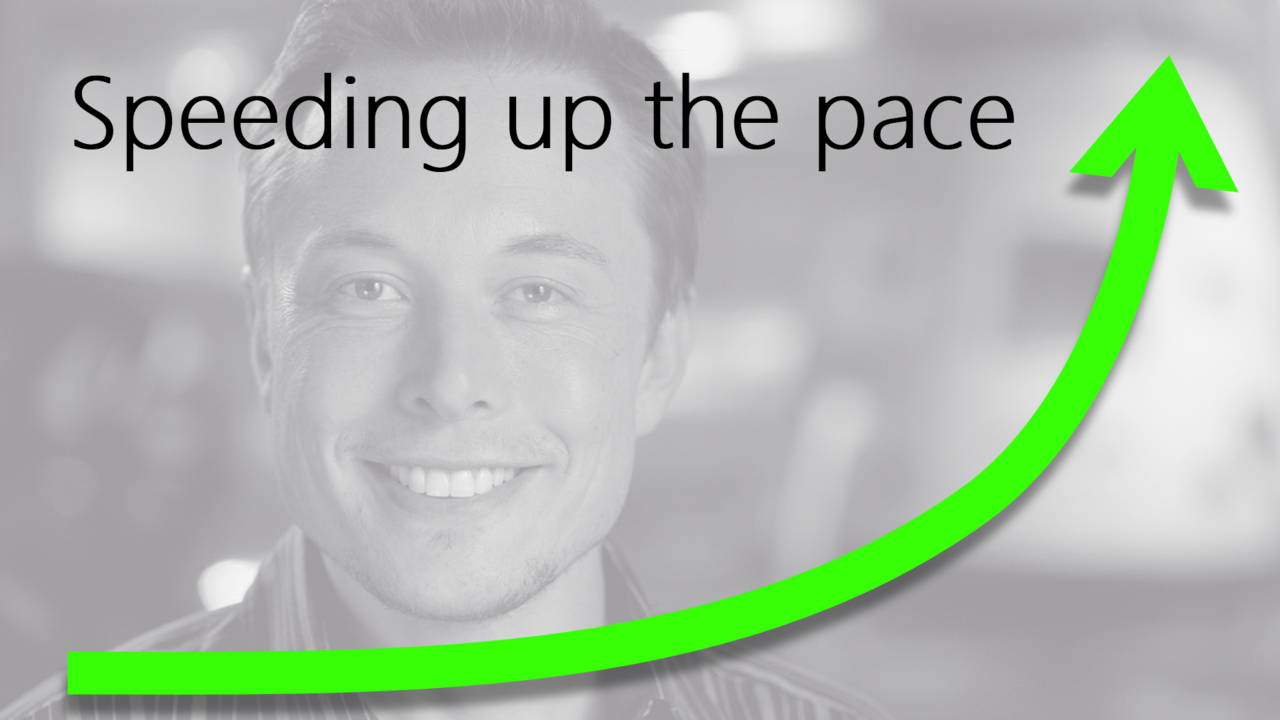Why Musk released patents? To speed up the pace.

- Is Musk crazy? No, very smart. The over-arching goal for Musk is primarily not making more money - but saving the Earth. Patents stifle progress hindering the acceleration of sustainable transport.
So, he aims to increase speed by applying an open-source philosophy and initiate an exponential growth curve. The world is now more interconnected than ever. Earth’s challenges are increasingly complex. Complexity requires cross-collaboration. The digital elements and AI enable exponential development allowing even 10X growth versus the traditionally linear +10% growth.

Lines and individuals alone cannot cope with the complexity and speed of development any longer. We need cross-teams for that purpose. This is where it really becomes different how winners today operate compared to how we used to work in mechanistic lines and silos. Typically, we’re not trained for creating value through cross-collaboration. Expect untrained cross-teams to have different goals, perspectives, opinions, cognitive preferences, and experience. Expect that they don’t understand each other. They’re set up for varying levels of destructive conflict or avoidance of conflict. When working within a line, these differences are much less. People are more like each other, understand each other and are not as exposed to diversity conflict-situations. This means that when flattening an organization and setting up cross-teams, you’ll need to train people in understanding what happens and methods to handle conflicting situations and emotions constructively.
Shifting to a complexity mindset
To increase efficiency we need to work differently. Boulton et al. (2015) strongly suggest we shift our mindset from a mechanistic world-view and embrace complexity. This will impact how we think about the world, how we structure our organizations, lead our resources, lead changes, and create value. Musk has understood and acted upon this. If we want adaptable, sustainable, and competitive organizations, a mechanistic world-view needs to be replaced with a complexity worldview - recognizing the world, business, and organizations are highly interactive and interconnected.
This shift may be hard for many as we strive for the great feeling of certainty, safety, and control. Uncertainty can be very challenging and cause feelings of confusion, hopelessness, and frustration we are wired to avoid. What is your worldview? Do you have a mechanical or a complexity mindset? Your company’s mindset? Are you structured for complexity?
We humans will work differently in the era of AI and robotics.
In collaboration with technology and AI, we’ll transit from ‘humans in factories’ to using the ‘human factor’ for creating value, spending time for good causes, and solving complex issues as never before. We’ll increasingly work in projects and teams to cope with complexity and need for flexibility and integration. To succeed you need to slow down to speed up. How good are your collaboration and adaptability skills? Look around you where you work. To what degree is communication constructive or destructive?

Methods for thriving with complexity and collaboration
The first pillar to enable cross-collaboration is having an over-arching goal bigger than yourself. What is your organization’s over-arching goal that inspiring you to join efforts and collaborate? If you don't have one - get one!
To deal efficiently with increasing complexity and change, people will need to be very good at core communication. To be creative, persuasive, collaborative, adaptable, and efficient (as an outcome), certain tools and methods are of tremendous help to bring this out. You need to know them by heart, so you easily can use them in challenging times - without thinking, just like riding a bicycle. These methods live by the principle ‘slow down to speed up’.
My contribution is by training leaders with ‘slow down to speed up’ communication methods either live, in technology-based programs – or soon in a book.
“Dear leader, can you too feel the increased speed and almost desperate need for working more efficiently? To speed up you actually need to ‘slow down’. Why? Digitalization and AI are changing the game for leaders. To be more efficient, understand:
- How exponential PACE requires a very different mindset and way of working - and how it allows immense growth or may even sweep you away
- How an out-dated organizational STRUCTURE is a partykiller - and how your organization’s STRUCTURE will be a barrier or blessing for sufficient agility and efficiency.
- How your PEOPLE’s collective, creative intelligence must be unleashed to tackle complex challenges – and why core human people skills quickly are becoming the most important differentiator to create smart, integrated, digitalized value.
You’ll find valuable contributions in the book from: Kimberly Lein-Mathisen, GM Microsoft Norway, Loveleen R. Brenna, CEO Seema, and Lars Rinnan, Group VP AI & Robotics AMESTO. We aim to give you insight and practical tips that may both help you make this world a better place and give you competitive edge.
PS. Please contact me at [email protected] if you want to know more or when the book is released (which is soon).
Take care and do good for our world!
Efwa



